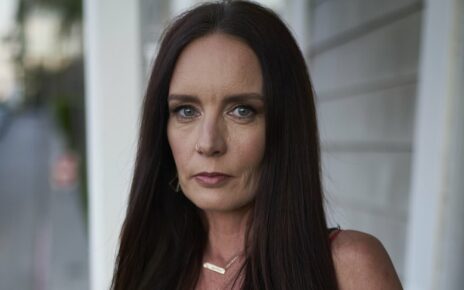This week, Depeche Mode’s two remaining members, Dave Gahan and Martin Gore, announced that they will be releasing a new studio album, “Memento Mori,” in the spring and embarking on a brace of tour dates next year.
The announcement was made just a few months after the death of co-founding member Andy “Fletch” Fletcher’s death in May, and the pair said the album, is a reflection on the fleeting nature of life. The tour also will be more intimate and play smaller venues than the ones the group, which first began playing stadiums in the 1980s, traditionally play.
The day after the press conference, Gahan Zoomed in from Berlin to give Variety some more insight on what went into the making of Memento Mori, which was produced by James Ford (who also produced the group’s last album, 2017’s “Spirit”) Marta Salogni (Björk, Animal Collective).
Did you feel a sense of responsibility toward Fletch where “Memento Mori” in concerned?
I hadn’t sung everything before he passed away, and certainly when Martin and I decided to continue working and went back to the studio, there was definitely something — a big part of what was normal to us — missing. And that’s Fletch of course, a huge personality, a huge part of what Depeche Mode had been up until this point. When I was singing, there were many times I was reflecting the loss of a friend and a companion and what that means.
The whole album, “Memento Mori,” leans into that a lot, into life and death and what that means, and where do we go, if anywhere, and what happens after. This life is a beautiful, amazing, wondrous thing that we really don’t know that much about — and it ends, abruptly, usually. It can be really cruel and punishing, as well, and fleeting. All these songs take you through that, through life, from beginning to the end in a way where at the beginning where you’re stating your place, “This is my life. I own it. You can’t tell me what to do.” And by the end of the album, it’s almost saying, “Please tell me what to do. I don’t know what I’m doing here. Help!”
Even after the pandemic, a lot of us are reaching the age when we’re losing friends. It’s kind of creating a sense of panic.
For me as well. It seems to be that in the last couple of years, you get a phone call from someone, “So-and-so passed” or “Oh, remember that guy that we met in Scotland? He’s gone.” It’s happened to me a couple times — Fletch, of course, and a friend of mine, the musician Mark Lanegan, earlier this year. Yesterday I was playing a playlist that Mark had sent me last year of songs, Gene Clark and all kinds of singer-songwriters that he wanted me to hear. Songs that he would say, “You’d sound great on this song.” I really miss that — playlists from Mark, songs that he felt, as a singer to a singer, would be good for me to sing. He’s gone. I miss him and what he brought to the world and his music. This is part of life as well. Death is a big part of life. We fear it and maybe we should somehow learn how to embrace it more.
I just turned 60 this year. Martin turned 60. In our minds, we both still feel very like these young kids still trying to figure out what we’re supposed to be doing. But at the same time, we’ve both lived a lot of life and we have all that as well, friends and family that you don’t get to see as much as you’d like to. We all want more. This is something that is human nature. We want more of everything. The truth is, at the end of the day, we realized we don’t need that much and it’s a luxury feeling, I know, to have that. I understand that there’s many people in this world that don’t have that much at all, who live awful, hard lives.
Music is what it does for me. My mood changes completely because I’m listening to something that is speaking to me. Always what we’ve tried to do is express the way we feel at this particular time, about the life we’re living in.
There is a massive fear of death, which is totally normal, but it feels like people think, “If I ignore it, it’s not happening.”
When you lose friends and family, of course it brings up your own mortality and you start questioning your own time on this earth and what you’re doing with it. The title, “Memento Mori,” translates to, “remember that you must die.” But also, as Martin said in a couple of interviews that we did, “It also reminds you that you must live.” Live your life in the best kind of way you can, be kind to the person on the street, smile, call a friend and tell them you love them — simple stuff that we take for granted. It’s like it sounds trite on some level, but it’s real. We are all busy in our own worlds and we forget to do it.
Why was this the first time you’ve used Martin’s home studio in Santa Barbara to record a Depeche Mode album?
James Ford, who produced this record, particularly loved it. In fact, that’s why we ended up recording all of the record in Martin’s studio in Santa Barbara. We were going to do it partially in New York as well, but we ended up just staying there because it was easier for me to get on a plane and fly from New York and just be at Martin’s house than move everything to New York. It worked out really well — it’s as good as any other studio that I’ve ever been in. It’s pretty elaborate and has just about every piece of musical technology and instrument, and endless vintage guitars and keyboards.
His house is up on the hill and his studio is just below it and he walks down there every day and potters around in his studio — especially during COVID, I think he found that place for him was kind of like a sanctuary.
Do you have a similar set up in New York?
I have a little studio in New York but not in my house. But if I have a song idea or something. I try, and in a very crude way, to work out the chords on my guitar, play that song into my iPhone, singing the melody and some words that I’ve written and then have a rough demo of something. Sometimes I get a bit more elaborate with that, but generally, on this record, that’s what I sent Martin. He would send me these very elaborate demos that were very completed and really well done, and I would send in these terrible recordings where I’d start and stop in the middle of a song. But Martin picked out what the song was clearly and then he would build up an idea to my idea and send it back to me, and then I would sing on it in a slightly more professional way, send it back to Martin. We did this for a while at the beginning of this year, and then we ended up in the studio together with me singing more professionally.
Was Fletch involved at that point?
Unfortunately, Fletch didn’t get to hear anything — he didn’t get to come and spend any time with us in the studio. He was about to — we had about 10 songs, and then everything came to a halt because Fletch passed away. We had to rethink what we were doing for a minute. First of all, if we were going to continue on? We decided we wanted to do that, continued recording and now the record’s being mixed in London. So here we are.
Last week, just before we came here to Berlin to do this press conference, Marta [Salogni, the album’s co-producer] put up some rough mixes of everything that she’d put together for a couple of days so that we could listen. We kind of worked out some sequencing of the songs and we both sat there and we listened. At the end, looked at each other said, “This is done. It’s good. Marta, you don’t need to do that much to it.” We know that whatever she’s going to do, we’re going to like because she’s fantastic. And James already did a fantastic job of producing it with us.
We felt still really fresh and vibrant, and exciting, and a little dangerous in places and also very loving and uplifting in other places. It’s got all that stuff — it’s the next level for us.
Read More About:
Source: Read Full Article


